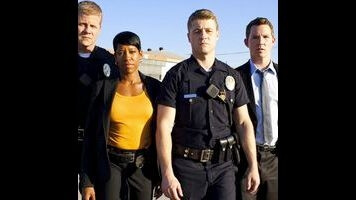Southland: “Integrity Check”

The LAPD is perhaps the most notorious major metropolitan police force in the country. A lot of that poor reputation comes with good reason, but Southland uses Los Angeles as a setting, not as a character. The Santa Ana winds played a role in one of the series’ standout episodes, but the show is about how being a cop bleeds into every other aspect of life, not about being a cop in Los Angeles. They may name-check parts of town or have well-researched standoffish relationships with the other law enforcement branches, but Southland isn’t as geographically specific to the police experience as many other cop shows. Which is one of the big reasons I was worried about the “mockumentary” device the moment it gets introduced. Inserting an actual documentary crew into the already realistic style of Southland takes on a certain amount of risk. The typical talking heads routine that allows — or forces, in the cases of both Cooper and Tang — the officers to say exactly what’s on their minds or to answer the question of the camera crew serving as audience surrogate in the backseat of the car. There’s potential for Cooper and Tang to merely talk at the cameras, but because of how well defined their characters are, their obvious discomfort and adversarial attitude towards the camera feels authentic, and the moments when the camera tilts down as the operator gets out of the back seat signal when a signature moment is about to be captured.
Take the scene in the bakery, with a white man demanding a storeowner complete his cake order, completely with his son Adolf’s name, and a few swastikas on top for good measure. It’s one long take, but the crew is clearly in one corner of the store, panning left and right as the actors move around. What’s much more difficult, and impressive, is how Liu, Cudlitz, and the supporting players shift through several different emotional moments in the span of a few minutes. It’s an artful and low-tech set piece that’s noticeable without overpowering the actors.
But Southland plays around with the documentary-within-a-show construct a bit, catching Dewey spouting off exactly what he always says without public scrutiny in a moment where he thinks the camera is off. In the morning briefing, Dewey’s intention to get a SAG card might be a joke, but it’s entirely plausible given his persona and that one episode with Tom Sizemore a few seasons back. He hams it up for the camera, yelling at a Plank-In on Hollywood Blvd., and gives a multilayered performance, a police officer acting like an exaggerated version of a stereotypically unhinged member of the LAPD — even if there’s some character truth buried in that act.
The final scene of the episode is where the documentary crew finally ceases to be a device and actually becomes a character. A cruel voyeur who stands silent as John Cooper struggles to subdue a suspect, suffers a neck wound, and begins to bleed out on the street. Holding that shot is excruciating, because all the man has to do is have some fucking human decency, consider that a man’s life is at risk instead of slightly higher television ratings, and drop the damn camera in order help. It’s an impossible point to miss, the useless bystander gawking at the gruesome spectacle, made all the worse by the fact that in that take the audience becomes the documentary crew, extending that thirst for intensity and violence to everyone watching. The season premiere kicked up to an extremely high level of tension with the shootout in the police department, but “Integrity Check” certainly topped that, displaying just how quickly things can go from ending a shift and turning the camera off to a desperately violent altercation.
 Keep scrolling for more great stories.
Keep scrolling for more great stories.
